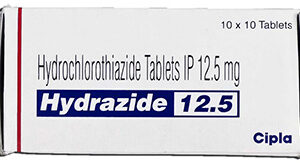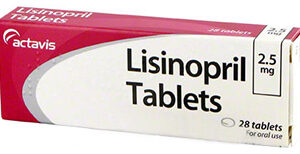Lisinopril Overview
Lisinopril, an antihypertensive pharmaceutical, belongs to the category known as angiotensin-converting enzyme (ACE) inhibitors. This compound is efficacious in managing hypertension, improving outcomes for individuals experiencing heart failure, and enhancing survival odds subsequent to myocardial infarctions. Its operation hinges on the inhibition of ACE, which results in reduced production of angiotensin II – a substance known to constrict blood vessels and elevate blood pressure. By mitigating this vasoconstriction, lisinopril helps in dilating blood vessels, thus lowering blood pressure and enhancing blood flow.
Lisinopril Indications
This medication is primarily indicated for the treatment of high blood pressure (hypertension), which can be employed in isolation or alongside other therapeutic agents. Additionally, lisinopril is advocated for heart failure management and plays a vital role in improving survival following heart attacks. By prescribing this ACE inhibitor, healthcare professionals focus on the prevention of strokes, heart attacks, and kidney problems.
Dosage & Administration
The dosage of lisinopril is tailored to each patient based on the specific condition being treated, response to therapy, and other medical considerations. It is commonly initiated at a low dose, with gradual increments to achieve optimal control over blood pressure. For hypertension, initial dosages typically begin at 10 mg once daily, potentially adjusted upward to a maximum of 40 mg daily, depending on the patient’s blood pressure response. Heart failure management typically begins at 2.5 to 5 mg, with possible escalation. For myocardial infarction patients, a 5 mg initial dose is generally prescribed, followed by 5 mg after 24 hours, 10 mg after 48 hours, and a maintenance dose ranging between 10 mg to 40 mg daily.
Lisinopril should be ingested orally, with or without food, better absorbed when taken at the same time each day. It is important that intake is consistent and that doses are not skipped, even when patients feel well, as hypertension often exhibits no symptoms.
Lisinopril Contraindications
Individuals with a history of hypersensitivity to any ACE inhibitor should refrain from using lisinopril. Additionally, this medication should not be taken by those who have had angioedema linked to previous ACE inhibitor treatment or have a hereditary form of angioedema. Caution is also imperative for patients with renal impairment or those undergoing renal dialysis. The use of lisinopril is contraindicated during pregnancy due to the risk of harm to the developing fetus.
Adverse Reactions
The administration of Lisinopril can provoke a spectrum of possible adverse reactions, ranging from mild to severe. Commonly reported effects include cough, headache, dizziness, fatigue, and nausea. Some individuals may experience hyperkalemia, or high potassium levels, which if left unchecked, can prove life-threatening. Rarely, patients may suffer from angioedema, a dangerous swelling beneath the skin’s surface. If any serious symptoms materialize, medical attention should be sought immediately.
Drug Interactions
Lisinopril’s efficacy can be influenced by interactions with other medications and substances. The concomitant use of potassium supplements, potassium-sparing diuretics, or salt substitutes containing potassium can lead to dangerously high levels of potassium in the blood. Nonsteroidal anti-inflammatory drugs (NSAIDs) may diminish the antihypertensive effects of lisinopril and augment the risk of renal impairment. Combination with other antihypertensive agents may potentiate the blood pressure-lowering effects, necessitating careful monitoring. Furthermore, lisinopril combined with certain diabetes medications might lead to a further reduction in blood glucose levels.
Precautions & Warnings
Extreme prudence is advised when employing lisinopril in individuals with pre-existing conditions, like liver dysfunction or electrolyte imbalances. Furthermore, those undergoing desensitization therapy for bee or wasp venom should be wary, as ACE inhibitors can amplify the risk of an anaphylactic reaction.
For those contemplating pregnancy or currently pregnant, the use of lisinopril should be avoided, given the potential embryotoxic and fetotoxic effects. Meticulous care should be taken to avoid abrupt cessation of the medication, as this can lead to a sudden spike in blood pressure, and patients should always consult a healthcare provider before making any changes to their medication regimen.
Overdose & Treatment
In the event of an overdose, one is likely to experience severe hypotension, electrolyte disturbances, and kidney failure. Immediate medical intervention is paramount in such scenarios, with treatment strategies centering on stabilizing the patient’s blood pressure and addressing symptomatic concerns. In certain situations, intravenous infusion of normal saline may be required to restore vascular volume. Where necessary, medical practitioners may employ hemodialysis to expedite drug clearance from the body.
Patient Education
Patients on lisinopril should be well-informed about the nature of their treatment. Education points include understanding the importance of consistently taking the medication even if feeling well, recognizing the signs of high potassium, and managing lifestyle factors such as diet, exercise, and avoiding smoking and excess salt. Knowledge of possible side effects and the imperative nature of immediate reporting of severe reactions can contribute significantly to a positive therapeutic outcome. Additionally, individuals are advised to communicate any changes in medications, including over-the-counter drugs or supplements, to their healthcare provider.
Storage & Handling
Lisinopril tablets should be stored at room temperature, away from excessive heat and moisture. The medication should be kept securely in its original container, out of the reach of children and animals. When no longer required, or if expired, pills should be disposed of in accordance with local regulations to avoid potential harm to others or the environment.
Leveraging this guide can aid patients and healthcare professionals in ensuring the safe and effective use of lisinopril as a pivotal part of hypertension and heart failure management strategies.






Reviews
There are no reviews yet.